Tans'ur William
1706-1783
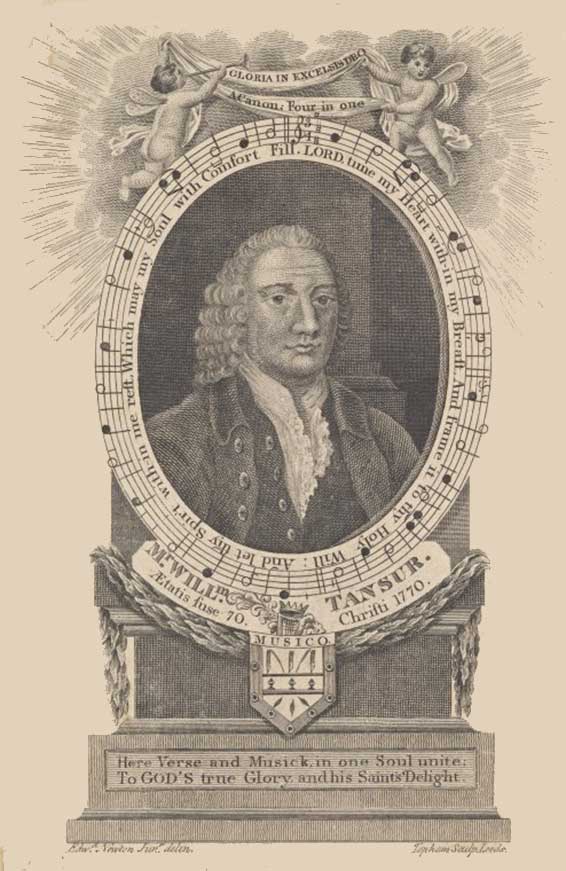
[Tansur, le Tansur, Tanzer]
Né à Dunchurch (Warwickshire), vers 1700, baptisé 6 novembre 1706, mort à St Neots, 7 octobre 1783).
Il est le fils d'un ouvrier agricole, Edward Tanzer et de Joan Alibone (Alliband). Il a adopté le nom de tans'ur. On connaît les éléments de sa biographie par les préfaces de ses ouvrages.
Ses parents meurent en 1712.
Psalmodiste, il se déplace beaucoup en Angleterre pour enseigner sa spécialité, et parfois être engagé comme organiste.
Il se marie le 20 mai 1730 avec Elizabeth Butler. Ils s'intallent à Ewell près d'Epsom, dans le Surrey. Ils ont deux fils. L'un, nommé également William Tans'ur, est choriste au Trinity College de Cambridge, ce qui permet à son père de signer quelques-unes de ses préfaces « Université de Cambridge », mais en réalité il n'a aucun contact avec l'élite musicale. Son autre fils, David, meurt en 1743, il est inhumé à Market Harborough le 8 janvier.
Il finit par se fixer à St Neots, à quatre-vingts kilomètres au nord de Londres, comme libraire et professeur de musique.
Il publie en 1735 son premier recueil de psalmodies, A Compleat Melody, or The Harmony of Sion, comprenant des psaumes métriques, des hymnes et des anthems, de deux à quatre parties sans accompagnement, en grande partie de sa composition. Il utilise les textes, en les révisant, de Al such Psalmes of Dauid as Thomas Sternhold, late grome of the Kinges maiesties robes, did in his lyfetime drawe into English Metre, livre de psaumes mis en métrique anglaise par Thomas Sternhold (1500–1549), augmenté et publié à Cambridge par John Hopkins en 1549.
Il publie la même année un second livre de même nature, The Melody of the Heart, basé cette fois sur les textes de la New Version of the Psalms of David, publiée par les poètes Nahum Tate et Nicholas Brady, en 1696.
Ces deux livres seront rassemblés, les psaumes publiés dans diverses collections jusqu'en Amérique, ont une grande influence (une centaine de compositions).
À partir de 1755, il introduit des chants fugués, en prenant soin que les parties en contrepoint ne soient pas obligatoires au chant. Certains furent très populaires et ont perduré dans le temps.
Bangor, Chœur d'étudiants, Thomas Aquinas College, 2014.
Colchester. "O 'Twas a Joyful Sound to Hear", Paul Hillier & His Majestie's Clerkes
O 'twas a joyful sound to hear
Our tribes devoutly say,
Up, Israel! To the temple haste
And keep the festal day.
At Salem's courts we must appear,
With our assembled powers,
In strong and beauteous order ranged,
Like her united towers.
May peace within thy sacred walls
A constant guest be found;
With plenty and prosperity
Thy palaces be crowned.
For my dear brethren's sake, and friends
No less than brethren dear,
I'll pray: May peace in Salem's towers
A constant guest appear.
But most of all I'll seek thy good,
And ever wish thee well,
For Sion and the temple's sake,
Where God vouchsafes to dwel.
St Martins, « While Shepherds Watched Their Flocks by Night », Andrew Remillard (piano).
While shepherds watched their flocks by night,
all seated on the ground,
an angel of the Lord came down,
and glory shone around.
"Fear not," said he for mighty dread
had seized their troubled mind
"glad tidings of great joy I bring
to you and all mankind.
"To you, in David's town, this day
is born of David's line
a Savior, who is Christ the Lord;
and this shall be the sign:
"The heavenly babe you there shall find
to human view displayed,
all simply wrapped in swaddling clothes
and in a manger laid."
Thus spoke the angel. Suddenly
appeared a shining throng
of angels praising God, who thus
addressed their joyful song:
"All glory be to God on high,
and to the earth be peace;
to those on whom his favor rests
goodwill shall never cease."
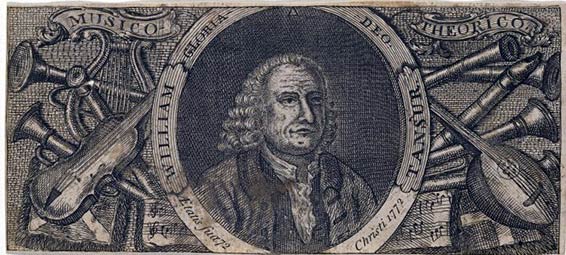
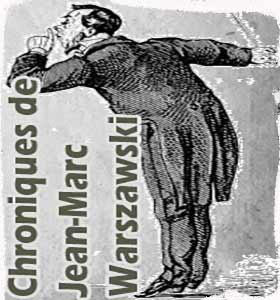
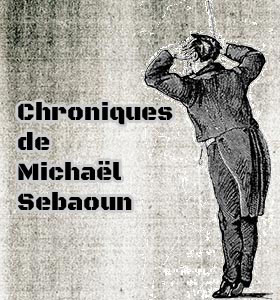
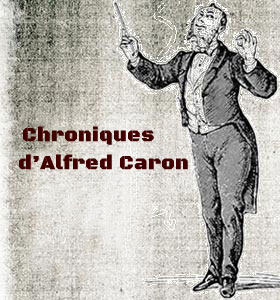
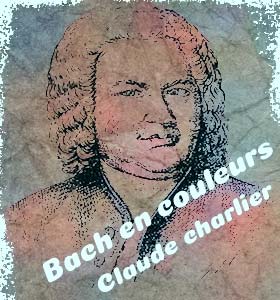
Écrits relatifs à la musique
A compleate melody or the Harmony of Sion [...] In three v. Containing
I. A new and compleat Introduction to the grounds of music
- London, W. Pearsonfor J. Hodges 1734 (1 exemplaire conservé)
- London, W. Pearsonfor J. Hodges 1735 (3 exemplaires conservés)
- London, A. Pearsonfor J. Hodges 1736 (1 exemplaire conservé)
- London, A. Pearsonfor J. Hodges 1738 (2 exemplaires conservés)
- London, R. Brown for J. Hodges 1743 [fifth edition](6 exemplaires conservés)
- Localisations : F : Paris, Bibliothèque de France
- GB : Aberystwyth, National Library of Wales - Cambridge, University Library - Edinburgh, National Library of Scotland - Edinburgh, Public Library - Glasgow, Mitchell library - London, British Museum - London, Royal College of Music - Manchester, Public Library - Oxford, Univ. Faculty Library.
- Fac-similé
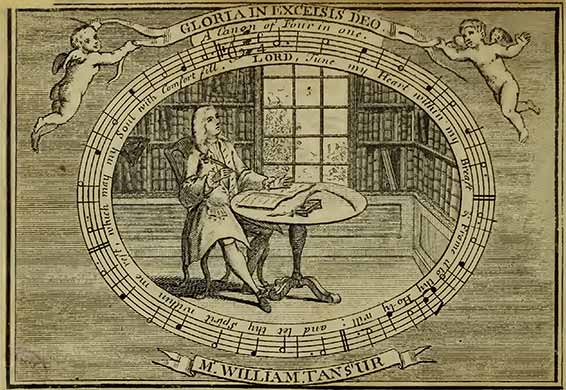
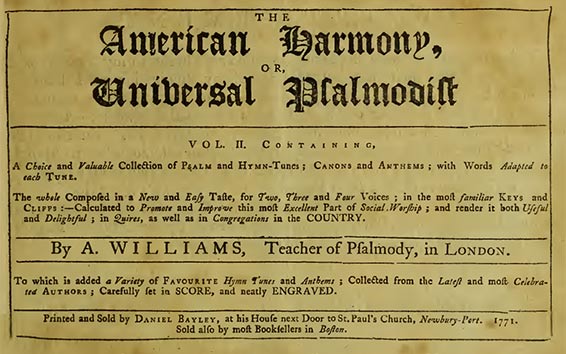
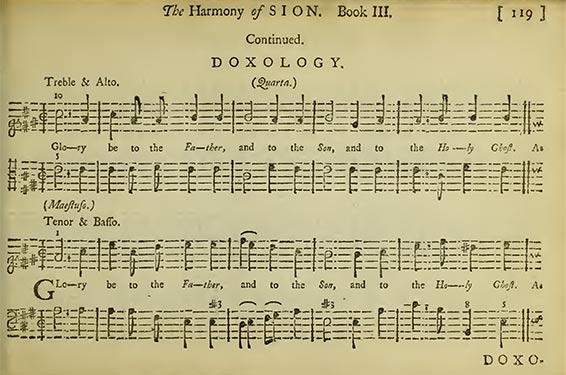
The American harmony; or royal melody complete. In two v. V. I
Containing I. A new and correct introduction to the grounds of musick. II.
A new and complete body of church-musick. III. A new and select number of
hymns, anthems, and canons. The whole are composed in two, three, four,
and five musical parts, according to the nicest rules; consisting of
solo's, fuges, and chorus's correctly set in score for voices or organ.
The 5th ed., with additions. By William Tans'ur, senior
- Newbury-port, Daniel Bailey 1769 [2 v.] (13
exemplaires conservés)
- Newbury-port, Daniel Bailey 1771 [6th edition] (11 exemplaires conservés)
- Newbury-port, Daniel Bailey 1771 [the 7th edition] (16 exemplaires conservés)
- Newbury-port, Daniel Bailey 1773 [8th
edition] (11 exemplaires conservés)
- Newbury-port, Daniel Bailey 1774 [the 8th edition] (6
exemplaires conservés)
- Newbury-port, Daniel Bailey 1774 [the 9th edition](1 exemplaires
conservés)
- Localisations : GB : London, British Museum
- US : Ann Arbor, William L. Clements Library - Boston, Mass., Boston Univ. - Boston, Mass., Massachusetts Historical Society Library - Boston, Mass., Music Department, Boston Public Library - Cambridge, Mass., Houghton library, Harvard university - Chicago, Ill. Newberry library - Cleve-land, Ohio, Western Reserve Historical Society - Glasgow, Euing Musical library - Hardford, Conn., Wat-kinson, Trinity College - Hartford, Conn., Newton Case Memorial Library, Hartford Seminary Foundation - Iowa City, Ia., Music Library, State University of Iowa - New Haven, Conn., School of Music Library - New York, N. Y., Music Division, New York Public Library - New York, N. Y., New York Historical Society - New York, N. Y., Union Theological Seminary Library - Northampton, Mass., Smith College library - Pittsburgh, Pa., Pittsburgh Theological Seminary Library - Providence, R. I. John Carter Brown Library - Salem, Mass., Essex Institute - Seattle, Wash., Music Mibrary, University of Washington - US : Ann rbor, William L. Cle-ments Library - Waco, Texas, Baylor University Library - Washington, D.C., Music Division, Library of Con-gress - Winston-Salem, N. C., Moravian Music Foundation - Worcester, Mass., American Antiquarian Society
- Fac-similé (1771)

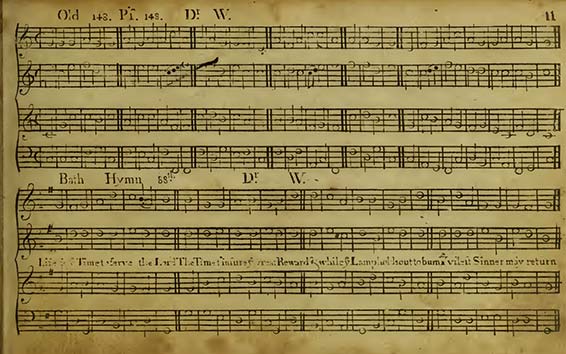
A new musical grammar: or, the harmonical spectator. Containing all the
useful theoretical, practical, and technical parts of musick. Being a new
and correct introduction to all the rudiments, terms, and characters, and
composition in all its branches. With several scales for musical
instruments; and philosophical demonstrations, on the nature of sound.
Laid down in so concise and easy a method, as to be understood by the
meanest practitioner, whether vocal or instrumental, by way of question
and answer. By William Tansur
- London, for the author (Jacob Robinson) 1746 (24
exemplaires conservés)
- London, for the author (Jacob Robinson) 1753, The second edition (2 exemplaires
conservés)
- London, the author, (Robert Brown for James Hodges) 1756 [A
new musical grammar, and dictionary: or a general introduction to the
whole art of musick. In four books. Teaching, I. The rudiments of tones.
with rules for tuning the voice, and beating of time; the nature of keys,
and transportation. II. Containing such plain and easy directions as are
necessary for tuning, and playing on, the organ, harpsichord, bass-viol
[...] with songs and lessons in great variety. III. The theory of sound
[...] Together with the principles of practical musick: or, the [...]
rules of composition. IV. The musicians historical and technical
dictionary. The 3rd edition, with large additions. By William Tans'ur
senior] (24 exemplaires conservés)
- Localisations : B : Bruxelles, Bibliothèque du conservatoire royal de musique - Bruxelles, Bibliothèque Royale
- C : Ottawa, National Library
- D : Berlin, Deutsche Staatsbibliothek
- EIR : Dublin, National Library of Ireland
- F : Paris, Bibliothèque de France
- GB : Aberdeen, University Library - Birmingham, University Library - Cambridge, King’s College - Cambridge, Pendlebury Library - Cambridge, University Library - Glasgow, Euing Musical library - Glasgow, Mitchell library - London, British Museum - London, Royal Academy of Music - London, Royal College of Music - Manchester, Public Library - Oxford, Bodleian Library - I : Roma, Biblioteca S. Cecilia (Conservatorio) - S : Stockholm, Musikhistoriska museet
- US : Ann Arbor, Mich., William L. Cle-ments Library University of Michigan - Austin, Tex., The University of Texas - Cambridge ; Mass., Harvard College library - Cambridge, Mass., Eda Kuhn Loeb Music Library, Harvard university - Chapel Hill, N.C., Music Library, University of North Carolina - Chicago, Ill. Newberry library - Hardford, Conn., Watkinson, Trinity College - Iowa City, Ia., Music Library, State University of Iowa - Ithaca, N.Y., Music Library, Cornell Univ. - Lexington, Ky., School of Music Library, University of Louisville - Los Angeles, Calif., William An-drewx Clark Memorial Library University of California - New Haven, Conn., School of Music Library - New York, N. Y., Music Division, New York Public Library - Philadelphia, Pa., University of Pennsylvania Library - Richmond, Va., Virginia State Library - Rochester, N.Y., Sibley Music Library, Eastman School of Music - Seattle, Wash., Music Mibrary, University of Washington - Urbana, Ill., University of Illinois Lirary - Was-hington, D.C., Music Division, Library of Congress.
- A musical Grammar. Stokesley, W. Pratt v. 1819.
- Fac-similé numérisé
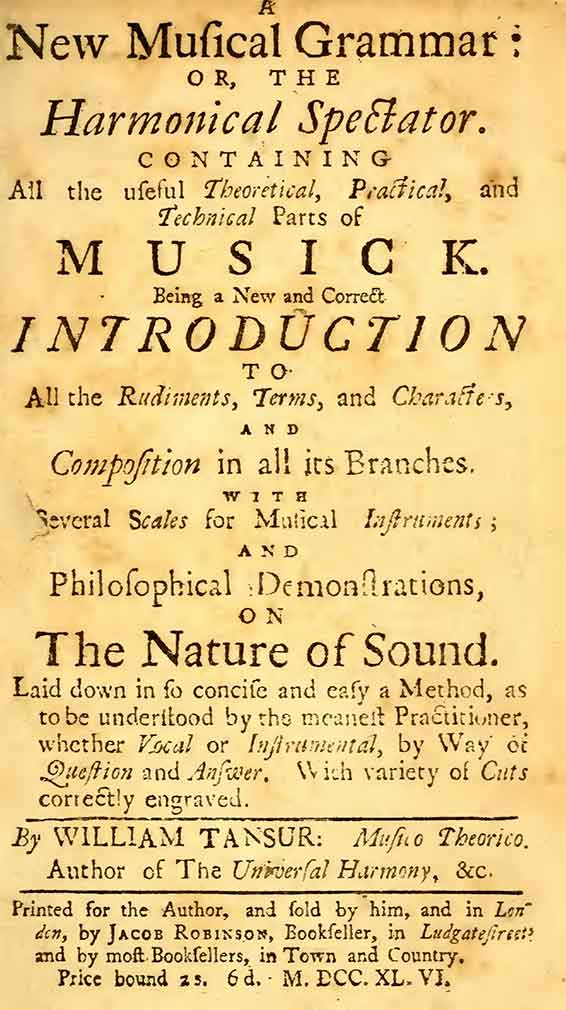
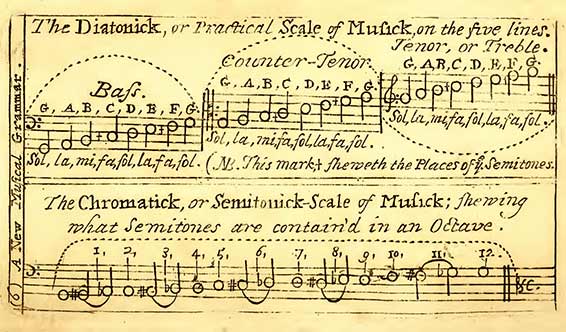
The elements of musick display'd: or, its
grammar, or ground-work made easy: rudimental, practical, philosophical,
historical, and technical. In five books. Containing. I. An universal
introduction to all the rudiments of musick. II. Of time, in all its
various moods [...] III. The structure of musical instruments. With sacred
lessons; songs in parts; and tunes for instruments. IV. The theory of
sound. with the principles of composition, in all its branches. V. A new
musical-dictionary. By William Tans'ur, senior
- London, the author artd his son
(Stanley Crowder) 1772 (31 exemplaires conservés)
- Localisations : C : Ottawa, National Library
- GB : Birmingham, University Library - Cambridge, King’s College - Cambridge, University Library - Glasgow, Euing Musical library - Glasgow, Mitchell library - London, Royal Academy of Music - London, Royal College of Music - London, British Museum - Manchester, Public Library - Oxford, Bodleian Library
- US : Ann Arbor, Mich., William L. Clements Library University of Michigan - Austin, Tex., The University of Texas - Boston, Mass., Boston Atheneum Library - Boston, Mass., Music Department, Boston Public Library - Chicago, Ill. Newberry library - Cambridge, Mass., Eda Kuhn Loeb Music Library, Harvard university - Chapel Hill, N.C., Music Library, University of North Carolina - Ithaca, N.Y., Music Li-brary, Cornell Univ. - Lexington, Ky., School of Music Library, University of Louisville - New Haven, Conn., School of Music Library - New York, N.Y., The Metropolitan Museum of art - New York, N. Y., Music Divi-sion, New York Public Library - Richmond, Va., Virginia State Library - San Francisco, Calif., The Sutri Li-brary - Urbana, Ill., University of Illinois Lirary - Washington, D.C., Music Division, Library of Congress - Washington, D.C., Folger Shakespeare Library
- The Elements of Musick display'd. New York, Broude Bros
- Fac-similé
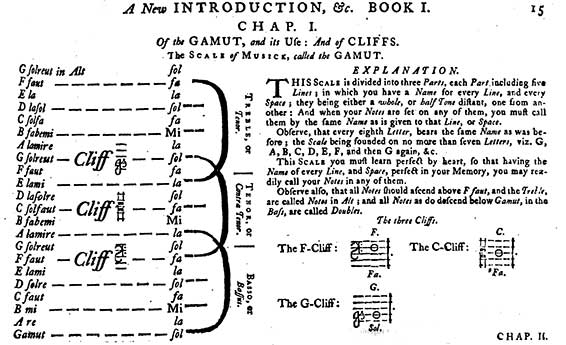
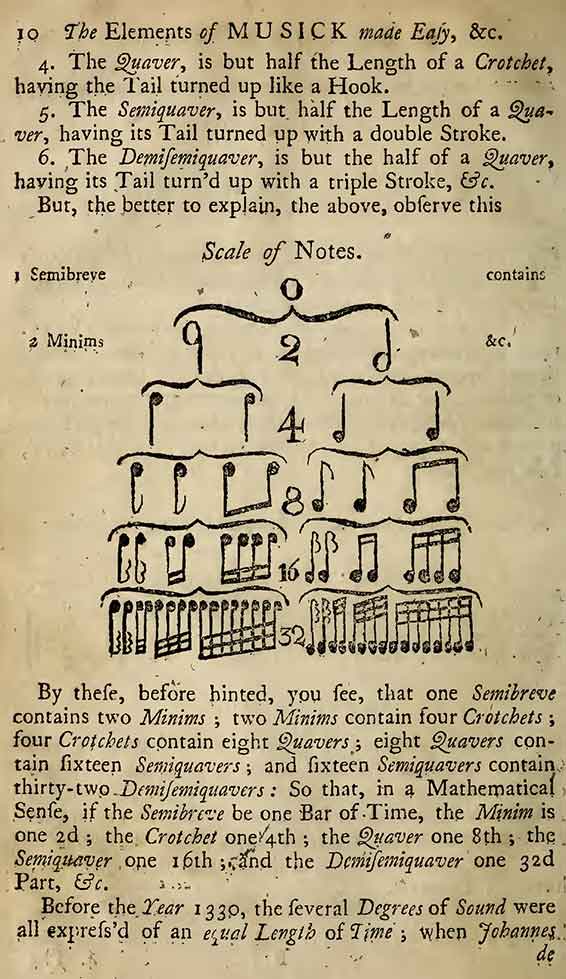
The Royal melody complete,
or the new harmony of Sion. In three books containing I. A new.
Introduction to the grounds of musick
- London, R. Brown for J. Hodges 1755 (5 exemplaires
conservés)
- London, R. Brown for S. Crowder 1760 [the second edition] (2
exemplaires conservés)
- London, R. Brown for S. Crowder 1764 [the 3d edition] (4 exemplaires
conservés)
- Boston, W. d'Alpine 1767 [the 3d edition with additions] (2
exemplaires conservés)
- Localisations : GB : Cambridge, King’s College - Cambridge, Trinity College - Dundee, Public Library - Edinburgh, National Library of Scotland - Glasgow, Euing Musical Libr - Glasgow, Mitchell library - London, British Museum - London, Royal College of Music - Oxford, Bodleian Library
- US : Salem, Mass., Essex Institute - San Mari-no, Calif., Henry E. Huntington Library and Art Gallery
- Fac-similé
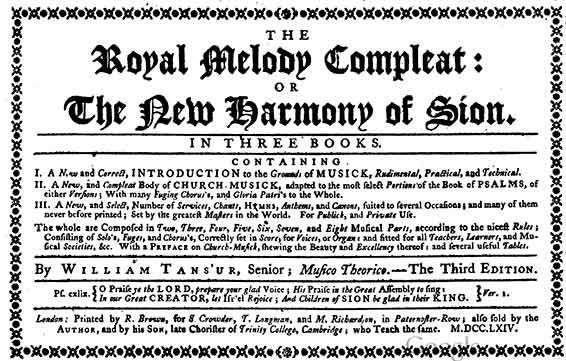

© Musicologie.org
 À propos - contact | S'abonner au bulletin | Biographies de musiciens | Encyclopédie musicale | Articles et études | La petite bibliothèque | Analyses musicales | Nouveaux livres | Nouveaux disques | Agenda | Petites annonces | Téléchargements | Presse internationale | Colloques & conférences | Collaborations éditoriales | Soutenir musicologie.org.
À propos - contact | S'abonner au bulletin | Biographies de musiciens | Encyclopédie musicale | Articles et études | La petite bibliothèque | Analyses musicales | Nouveaux livres | Nouveaux disques | Agenda | Petites annonces | Téléchargements | Presse internationale | Colloques & conférences | Collaborations éditoriales | Soutenir musicologie.org.
Musicologie.org, 56 rue de la Fédération, 93100 Montreuil. ☎ 06 06 61 73 41.
ISNN 2269-9910.
Lundi 26 Avril, 2021















 À propos - contact | S'abonner au bulletin | Biographies de musiciens | Encyclopédie musicale | Articles et études | La petite bibliothèque | Analyses musicales | Nouveaux livres | Nouveaux disques | Agenda | Petites annonces | Téléchargements | Presse internationale | Colloques & conférences | Collaborations éditoriales | Soutenir musicologie.org.
À propos - contact | S'abonner au bulletin | Biographies de musiciens | Encyclopédie musicale | Articles et études | La petite bibliothèque | Analyses musicales | Nouveaux livres | Nouveaux disques | Agenda | Petites annonces | Téléchargements | Presse internationale | Colloques & conférences | Collaborations éditoriales | Soutenir musicologie.org.